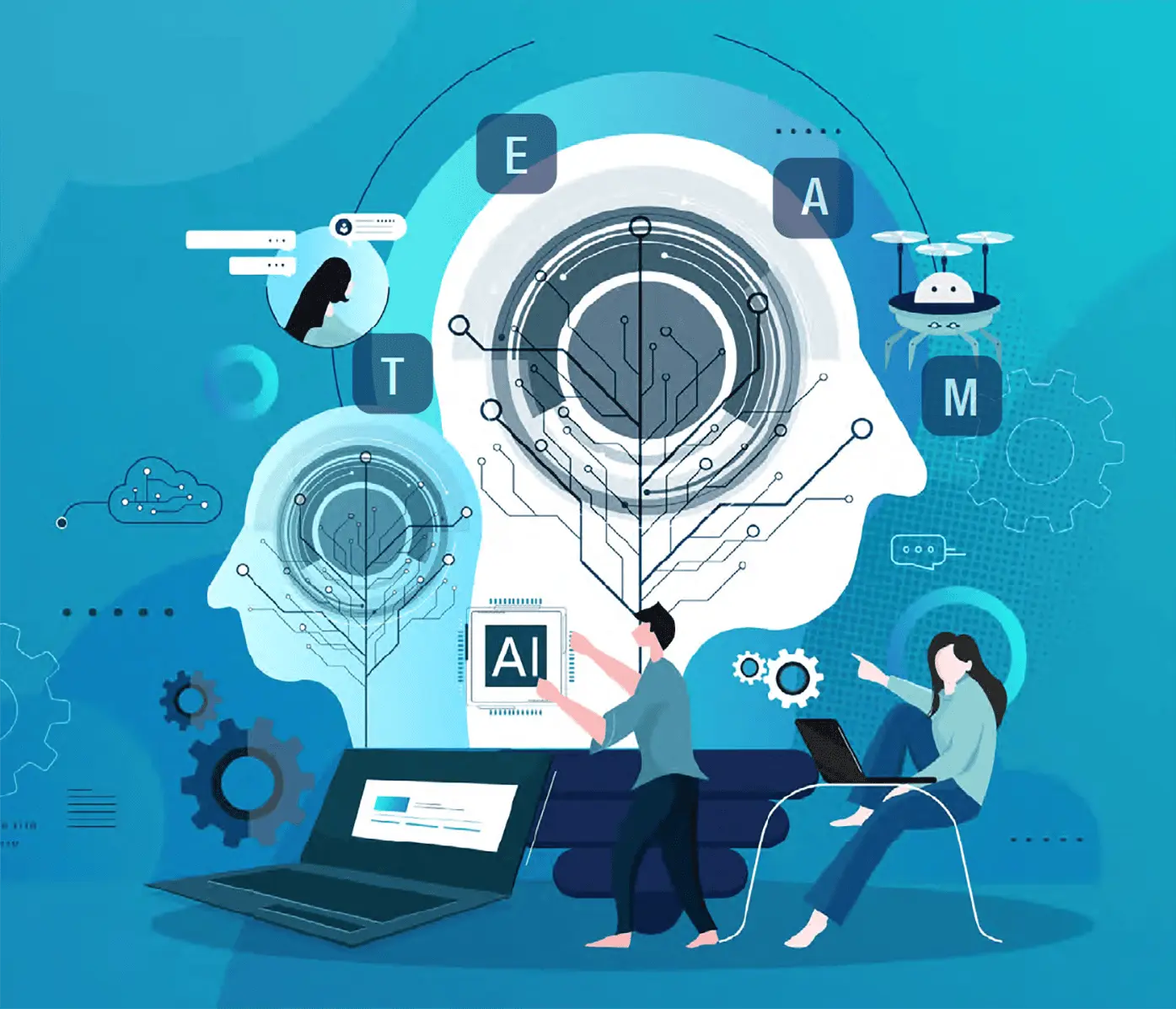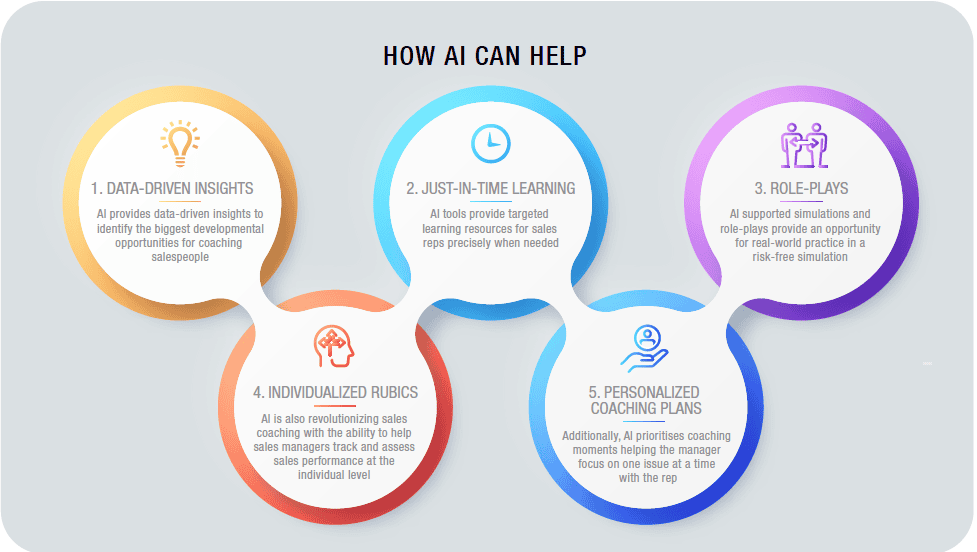A technology teammate
30th September 2024 | Julie Thomas

Here are five ways to revolutionize sales coaching with AI…..
Adoption of AI has exploded over the past year, forever changing the sales profession and bringing about a paradigm shift in sales coaching. This transformative technology offers new ways to enhance performance while nurturing the invaluable human-to-human relationships that underpin successful sales endeavours.
Sales professionals have already embraced AI to enhance their efficiency and effectiveness, and they are finding it to be a valuable tool. AI allows them to quickly research companies and prospective buyers, and to synthesize lengthy documents such as financial reports and call transcripts in seconds. It also assists in crafting personalized outreach, messaging, and follow-ups, freeing up time for more analytical tasks.
Takeaway: Adopting AI as a coaching tech teammate offers the opportunity to boost team performance and improve sales results.
What’s next? AI is stepping in as a technology teammate, empowering sales managers to scale sales coaching and build desired selling behaviours among their team members. Sales leaders are pivotal in nurturing and guiding their teams to achieve targets, but this crucial task often takes a back seat as managers struggle to balance sales goals with developing their people.
Missing development opportunities
According to Gartner surveys, 60% of sellers do not have access to relevant learning opportunities and 75% of managers report that their organizations are not fully effective at providing them with the development opportunities needed in today’s work environment.
This new tech teammate can provide targeted sales coaching tools for sales reps precisely when needed and save sales managers precious time by analyzing data and pinpointing critical coaching opportunities where timely guidance can positively influence deal outcomes.
How AI can help
Here are five ways AI is revolutionizing sales coaching.
1. Data-driven insights. AI provides data-driven insights to identify the biggest developmental opportunities for coaching salespeople. AI tools have the capability to analyze vast amounts of data, saving managers countless hours previously spent listening to recordings of sales calls or reading notes in the CRM system.
Based on the data analysis, AI provides sales managers with insights into team performance that go beyond simple metrics and helps identify patterns and trends that may not be apparent through traditional methods. For example, at ValueSelling Associates we teach salespeople that they need to uncover the prospect’s business issue, which we define as a major impediment that’s getting in the way of key business drivers.
Once trained on the proper criteria and historical opportunity data, AI can detect that your sales rep, “Kayla”, is working 15 new opportunities, and the business issues she captured for five of them are not true business issues but lowerlevel problems. AI also provides three questions for the sales manager to ask Kayla to help her self-inspect the situation and discover the gap. The sales manager’s role then is to help her to close that gap.
2. Just-in-time learning. AI tools provide targeted learning resources for sales reps precisely when needed. This enables sales teams to build the desired selling behaviours and advance opportunities autonomously, speeding the process, and minimizing the need for direct oversight from their manager.
As reported by Demand Gen Report, Gartner research highlights two powerful strategies that can be incorporated into coaching: behavioural nudges and just-in-time learning. “Behavioural nudges are interventions that alter behaviour in a predictable way without forbidding options or significantly changing economic incentives, while just-in-time learning provides sellers with the exact information needed to execute an action when they need it.” Both of these strategies can be aided by an AI coaching tool.
For instance, with the planned learning management system (LMS) integrations for ValueSelling Associates’ ValueCoach AI™ tool, if a sales rep scores two out of five on objection-handling on a sales call or role-play, the tool recommends specific just-in-time learning modules on how to handle sales objections as a next step in the learning process.
3. Role-plays. AI supported simulations and role-plays provide an opportunity for real-world practice in a risk-free simulation. They are especially impactful when the AI model is trained on an organization’s unique sales process, ideal customer profiles (ICPs), chosen sales methodology, and product/competitor data. Through AI simulated role-plays, sales reps receive real-time feedback on content and delivery, empowering them to refine their skills. This in turn enhances their confidence and helps them focus on authenticity and relationship building to engage buyers more effectively. As a result, they will be able to close bigger deals faster.
AI models can also evaluate recordings of real sales calls, transcripts and notes from CRMs. This data is used to evaluate sales rep behaviours, provide assessments, and launch targeted learning resources to address areas of difficulty. For instance, an AI tool can offer feedback such as: “I heard you talking more than the prospect. Based on your other closed-won opps with similar prospects, try asking questions like these in the first five minutes of your next call to get the prospect talking to learn more about their ideal solution.”

4. Individualized rubrics. AI is also revolutionizing sales coaching with the ability to help sales managers track and assess sales performance at the individual level using customized rubrics that are dynamically updated based on sales calls and opportunity data, as well as sales coaching sessions. This helps managers identify coaching moments, refine strategies and create personalized coaching plans for each team member.
AI can learn an organization’s rubric scorecard and use algorithms to assess an individual’s strengths and weaknesses based on their performance data against the rubric’s defined sales standards and criteria. From there, AI can generate a customized coaching program in line with the organization’s sales methodology. For example, if a sales representative consistently struggles with closing deals in a particular industry, the AI coaching tool can recommend targeted learning modules or suggest mentorship from a team member with expertise in that area.
What’s impressive is AI’s ability to adapt and recalibrate rubrics dynamically based on real-time data and insights. For instance, if certain aspects of the sales process become more critical to success due to shifts in market dynamics, AI can adjust the rubric to give greater weight to those factors. AI can also detect nuances in performance and refine the rubric to reflect subtle improvements or areas that need further development. This adaptability ensures that the rubric remains relevant and aligned with the evolving priorities of the sales team, providing a more accurate and meaningful measure of improvement over time.
5. Personalized coaching plans. Additionally, AI prioritises coaching moments helping the manager focus on one issue at a time with the rep, rather than overwhelming them with too many things at once. That’s why a golf coach doesn’t suggest changes in a player’s grip, swing and stance at the same time. They work with the player to first change their grip; then, as the player builds muscle memory, they’ll start to adjust the swing, and down the road work on the stance.
These adaptive plans not only enhance the effectiveness of sales coaching, but also demonstrate to sales reps that their managers are invested in their growth and development. Coaching happens best when there’s a trusted, authentic and caring relationship between the coach and the team member.
This is why AI needs to be coupled with a human connection. Sales reps instinctively know when their manager has their best interest at heart and will take their feedback much more seriously than purely automated feedback. This can boost morale and motivation within the team, leading to improved overall performance.
AI also removes bias without the drama. A manager may be tougher on one sales rep than another and may not consciously realize it. AI doesn’t care about opinion, seniority or past experiences; it only cares about data and facts rather than emotional assumption to make decisions and provide unbiased feedback aligned with the organization’s specific sales process.
Conclusion
AI is modernizing sales coaching for both managers and reps, putting powerful tools at their disposal. With data-driven insights, just-in-time learning, simulations and role-plays, individualized rubrics and personalized coaching plans, sales managers can save reps’ time, make informed and unbiased decisions, and enhance performance of each individual team member.
As the role of AI continues to evolve and permeate every aspect of sales, forward-thinking sales managers who embrace AI for sales coaching will undoubtedly take a significant step forward, gain a competitive edge and improve sales results. The journey towards excellence in sales coaching has never been more promising.

